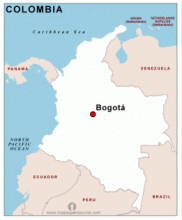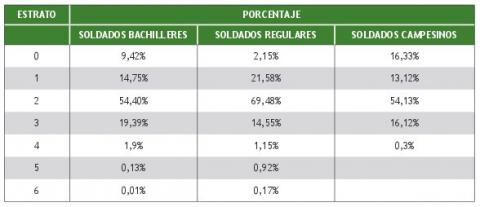Country report and updates: Colombia
This country report was updated in 2021. For now, it's only available in Spanish.
Updated February 2017; researcher Victoria E. Giraldo
Issues
-
Illegal recruitment is still taking place in most major cities in Colombia. In many cases, this process is ignored by the authorities;
-
No law regulates the right to conscientious objection, though the right has been recognised by the Constitutional Court;
-
Forced recruitment is undertaken by non-state armed groups.
1 Conscription
conscription exists
All men between the ages of 16 and 28 are liable for military service. Every man has to define his military situation before the age of 181, even if he has a right to exemption or postponement. Schools are obliged to draw up a list of students in their last year of high school and submit it to the military. Even if they have not yet finished their studies, in some districts they are already eligible for conscription. Once enrolled in the conscription process, they are subject to psychological and physical tests, and then the authorities undertake a raffle to randomly select regular soldiers (to serve from between 18 to 24 months), 'bachelor' soldiers (to serve for 12 months), police officers (to serve for 12 months) or rural soldiers (to serve from 12 to 18 months), depending on the local authorities and the military district. Each local military district determinates what type of soldier they need, and the length of service.
postponement and exemption
The law that regulates military service is no. 48 of 1993. It determines that military service, even though is mandatory for every adult man, has some exceptions. These are (i) regular exemptions – without payment of military compensation - and (ii) peace time exemptions – with payment of military compensation.
Regular exemptions:are available to (i) people who have physical and sensory limitations and (ii) indigenous people who live in their territory and preserve their cultural, social and economic integrity.2
For the former group, citizens who have cognitive or mental deficiencies do not have any difficulties in gaining their exemptions. However, for indigenous people, the process is not so easy. Recently, the Defensoria del pueblo published a list of acts that consistently violate the rights of indigenous people. These included the process for exemption, by which the military judges the veracity of claims to indigenous status. They use either an outdated census, or a certificate issued to an individual by their community, which the authorities do not always recognise.3
In peace time, exemptions are available to (a) clergymen and full-time religious people, (b) convicts who have lost political rights, (c) children without siblings (d) orphans who are supporting siblings, (e) children of disabled fathers aged 60 years or over, (f) brothers or children of injured during military service, (g) married men, (h) partially disabled people and (i) children of Fuerza Pública (Public Force) officers who died or acquired a severe disability in combat or during military service.4
Additionally, law 1448 (of 2011) adds a further peace time exemption (without the payment of military compensation) to all the victims of the armed conflict who have defined their condition through the registry system of victims - RUV.5
Law no. 48 of 1993 outlines the following situations where postponement is possible: (a) having a sibling who is currently undertaking military service, (b) being detained by civil authorities in the period of recruitment, (c) being temporarily disabled, (d) having been accepted, or already be studying, in establishments recognised by the ecclesiastical authorities, like preparation centres of religious life or a clerical career, (e) be enrolled in a training school for officers (f) being enrolled on the last course of high school, the loss of which would prevent them from finishing the course (g) conscript men who claiming an exemption in explicit accordance of the present law.
Law no. 548 of 1999 adds young men who are doing advance higher education. In 2001, it was clarified that those who are enrolled in an undergraduate programme can postpone the definition of their military situation until their studies are completed.6 Unfortunately, in the military districts there is not a clear idea of what advance higher education means: some think it includes technical education, but other districts it only includes university education. Additionally, those who do not define their situation at the end of their studies cannot obtain their professional title.
forced recruitment
Arbitrarily, men are taken to military barracks with the aim to force them to register, take exams and, if suitable, incorporate them immediately into the army. Even though the Constitutional Court has prohibited such detentions, known as batidas, they are still being performed, usually with unidentified means of transport, such as trucks without plates or school buses.7 In general, these practices are taking place in Bogotá by military districts from other regions, therefore, the illegally recruited men are transferred to other towns where the authorities verify their military situation and, if suitable, they are incorporated immediately.8
2 Conscientious objection
The Constitutional Court's ruling c-728 of 2009 recognises that conscientious objection is a reasonable grounds for military service exemption, however, it also states that there is no need for a specific regulation to outline this right. In other words, such a law still does not exist. After a few political efforts to regulate conscientious objection9, the debates did not gain much public attention and have always been shelved. Certainly, applicable legal sub-rules exist10, however the ignorance of the authorities, the difficulties in assessing the evidence and the judicial silence means in reality this right is not available.
According to the National Recruitment Agency's figures, 80% of cases of conscientious objectors invoke religious reasons and 20% cite ethical and philosophical motivations. Until 2005, there were five successful cases. The first recognition of a conscientious objector was resolved in 2009, however this not widely known amongst conscripts. According to Diego Carreño, a member of Accion colectiva de objetores y objetoras de conscienca (ACOOC), four out of the five cases citred religious motivations, and one political.
3 Draft evasion and desertion
Those exempted from the provision of compulsory military service by: (a) any of the reasons provided by the Article 28; (b) a disability; or (c) if a district has already filled its quota of soldiers will be regarded as "classified" and will have to pay a contribution to the National Treasury, called a "military compensation fee". The minimum amount for a military compensation quota will not be less than 50% or 60% of the legal monthly minimum wage. The total family income and assets of the person concerned, or of the person on whom he or she demonstrates financial dependency, will be used as the basis for this calculation.
Currently, young people who avoid recruitment or are not enrolled must pay a fine equivalent to 50% or 60% of a the monthly legal minimum wage. Those who evade the draft, but then later do perform military service, are exempted from paying a fine and a compensation fee. Colombians who do not define their situation not only incur a fine, but cannot access a number of goods and services, as well as rights to education and work. Therefore, the worst and most coercive sanction for perceived draft evasion or desertion is the apparent death of political and civil citizenship.
There is no procedure to ensure that citizens are immediately discharged when applications for exemption or deferral are favourably resolved. It takes between 20 and 40 days, even when the exemption or deferral tests are completed, and often the military authorities refuse to carry out the procedure for purely bureaucratic reasons. There have been cases in which irregular disruption of recruitment takes up to 4 months to be resolved.11
forced recruitment by non-state armed groups
There is also forced recruitment into non-state armed groups, including children. Sentence C-781 of 2012 of the Constitutional Court demands that every under-age child - male or female - recruited or used by guerrilla and paramilitary groups for war purposes or intelligence be recognised as a victim of war. In this way, they would be covered by a cause of exemption i.e. they cannot be recruited again.
Statistics
Data provided by the recruitment authorities shows that the majority of Colombians who perform compulsory military service are between the ages of 19 and 21.
(Source: http://www.defensoria.gov.co/public/pdf/ServicioMilitarObligatorio.pdf)
(Source: http://www.defensoria.gov.co/public/pdf/ServicioMilitarObligatorio.pdf)
Likewise, it is evident that most of the soldiers belong to strata 0, 1 and 2 - that is, the lowest socio-economic strata. In other words, they are young soldiers with very limited economic resources.
BIBLIOGRAPHY
- Constitución Política de Colombia 1991.
- Informe de la Defensoría del Pueblo. Servicio Militar Obligatorio en Colombia. Incorporación, reclutamiento y objeción de conciencia. Bogotá, D.C, 2014. Disponible en: http://www.defensoria.gov.co/public/pdf/ServicioMilitarObligatorio.pdf
- ¿Cómo hacer uso de la objeción de conciencia para no prestar servicio? El tiempo.com. Disponible en: http://www.eltiempo.com/politica/justicia/no-prestar-servicio-militar-por-medio-de-la-objecion-de-conciencia/15543219
- Actividad legislativa congreso colombiano. Available on: http://www.congresovisible.org
- Quinto Mandamiento. Colectivo de objetoras y objetores de conciencia. Available on: https://quintomandamiento.wordpress.com/2012/03/
1 Although the Convention on the Rights of the Child determines that the minimum age of recruitment is 15 years old, in Colombian law it is 18 years. Not even with the permission of the parents can a child under 16 be recruited.
2 48 - 1993, Art. 27.
3 Informe de la Defensoría del Pueblo. Servicio Militar Obligatorio en Colombia. Incorporación, reclutamiento y objeción de conciencia. Bogotá, D.C, 2014. Pág 34.
4 48 - 1993, Art. 28.
5 Decreto 4800 de 2011, Art. 178 reglamentado en la Ley 1448 de 2011.
6 642 - 2001, Art. 1º.
7 Reported cases by Defensoría del Pueblo. See more: http://www.defensoria.gov.co/public/pdf/ServicioMilitarObligatorio.pdf
8 Statement C-879 de 2011.
9 Law project 102 - 2008, 115 - 2010, 2 - 2012 and more recently, law project 20 - 2015.
10 See more: http://www.defensoria.gov.co/public/pdf/ServicioMilitarObligatorio.pdf
11 This situation has been reported by Defensoría del Pueblo - Regional Boyacá. For example, the case of Nillin Alexánder Pérez, Cristian Javier Pérez and Holan Steven Mayorga Vanegas.
Recent CO action alerts: Colombia
Recent stories on conscientious objection: Colombia
You’re invited to the webinar series “The right to conscientious objection to military service in times of war”. The series will include a number of webinars each focusing on a particular conflict zone with the participation of conscientious objectors and campaigners on conscientious objection to military service. This first webinar will take place on 9th February at 4pm CET with the participation of activists from Ukraine, Colombia and Eritrea.
International Conscientious Objection Day (CO Day), 15th May, was celebrated with actions and events by activists from around the world in solidarity with those who have and those who continue to resist war. This year we had a particular focus on Turkey.
The Collective Action of Conscientious Objectors (Spanish: la Acción Colectiva de Objetores y Objetoras de Conciencia, or ACOOC) is a social organization which, based around the concepts of nonviolence and conscientious objection, supports alternatives to Colombian militarism, militarization, and the patriarchy, via legal, public campaigning, and educational strategies. Since 2006, ACOOC has worked alongside young people and their communities with to cultivate a peaceful culture.
The first webinar of our series, Campaigning for Conscientious Objection to Military Service, co-organised with QUNO and IFOR, is taking place on Wednesday, 3rd Feb. In our first event, we will have campaigners from Geneva (Switzerland), Seoul (S.Korea) and Bogotá (Colombia), explaining the role of litigation in their campaigns supporting conscientious objectors.
In February of this year, we sent out a CO-Alert of a Colombian Conscientious Objector, Brayan Gonzalez, who was irregularly recruited by the Army. His CO application wasn't recognised by the military Interdisciplinary Commission. To avoid being charged for desertion, he decided to come back to the battalion. He continues refusing inside the battalion. Read Brayan's story and consider sending the support letter.


